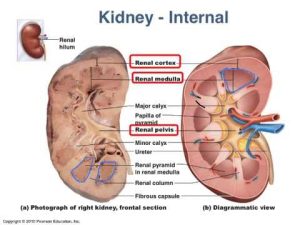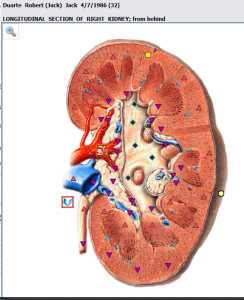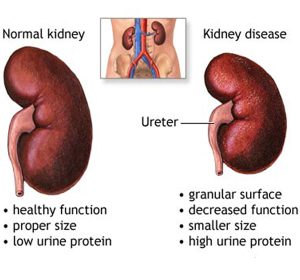Kidney Stones Prevention Wellness Protocol >>
https://www.bitchute.com/video/3eNQkiM5yoYV/



CORE PROGRAM >>
FULL Vitamin K2 two caps twice per day
Magnesium Potassium Citrate two to four capsules twice per day
BioLVR one capsule twice per day
Super Folate TR one capsule twice per day
Power Methyl B12 one sublingual tablet twice per day
Vein Away two capsules twice per day
Power C PLUS four capsules twice per day
Bladder Up two softgels twice per day
————————————————————————————————————————
* Drink plenty of fluids
- Water, lemonade, and most fruit juices can help dilute the substances in the urine that form kidney stones; avoid grapefruit juice and soft drinks
- Don’t eat too much animal protein
- Diets high in animal protein are linked to increased calcium in the urine, which contributes to oxalate stones
- Avoid foods with organic acids (oxalates) that can help stones form
- Limit your intake of spinach, rhubarb, beet greens, nuts, chocolate, tea, bran, almonds, peanuts, and strawberries, which appear to significantly increase urinary oxalate levels
- Protect yourself with vitamin B6 and magnesium
- Taking 50 mg a day of the supplement vitamin B6 with 200 to 400 mg a day of the mineral magnesium (preferably in the form of magnesium citrate) can inhibit oxalate stone formation
- Check out calcium
- If your healthcare provider has determined that you do not over-absorb calcium, take 800 mg a day of calcium (in the form of calcium citrate or calcium citrate-malate) with meals
These recommendations are not comprehensive and are not intended to replace the advice of your doctor or pharmacist. Continue reading the full kidney stones article for more in-depth, fully-referenced information on medicines, vitamins, herbs, and dietary and lifestyle changes that may be helpful.
Kidney stones are hard masses that can grow from crystals forming within the kidneys. Doctors call kidney stones “renal calculi,” and the condition of having such stones “nephrolithiasis.”Most kidney stones are made of calcium oxalate. People with a history of kidney stone formation should talk with their doctor to learn what type of stones they have—approximately one stone in three is made of something other than calcium oxalate and one in five contains little if any calcium in any form. Calcium oxalate stone formation is rare in primitive societies, suggesting that this condition is preventable.1People who have formed a calcium oxalate stone are at high risk of forming another kidney stone.
What are the symptoms?
Kidney stones often cause severe back or flank pain, which may radiate down to the groin region. Sometimes kidney stones are accompanied by gastrointestinal symptoms, chills, fever, and blood in urine.
Dietary changes that may be helpful
Increasing dietary oxalate can lead to an increase in urinary oxalate excretion. Increased urinary oxalate increases the risk of stone formation. As a result, most doctors agree that kidney stone formers should reduce their intake of oxalate from food as a way to reduce urinary oxalate.2 Many foods contain oxalate; however, only a few—spinach, rhubarb, beet greens, nuts, chocolate, tea, bran, almonds, peanuts, and strawberries—appear to significantly increase urinary oxalate levels.3 4Increased levels of urinary calcium also increases the risk of stone formation. Consumption of animal protein from meat, dairy, poultry, or fish increases urinary calcium. Perhaps for this reason, consumption of animal protein has been linked to an increased risk of forming stones5 6 7 8 and vegetarians have been reported to be at lower risk for stone formation in some reports.9 As a result, many researchers and some doctors believe that people with a history of kidney stone formation should restrict intake of animal foods high in protein.In one controlled trial, contrary to expectations, after 4.5 years of follow-up, those who restricted their dietary protein actually had an increased risk of forming a kidney stone, compared with the control group.10 The findings of this trial conflict with the outcomes of most preliminary studies,11 12 and need to be confirmed by further clinical trials.13 Other researchers have found that a low-protein diet reduces the risk of forming stones.14 15 Although high-protein diets should probably be avoided by people with kidney stones, the effect of restricting dietary protein to low levels (below the RDA level of 0.8 grams per 2.2 pounds of body weight per day) remains unclear. Until more is known, it makes sense to consume a diet with a moderate amount of protein, perhaps partially limiting animal protein, but not limiting protein from vegetarian sources, such as nuts and beans.Salt increases urinary calcium excretion in stone formers.16 17 18 In theory, this should increase the risk of forming a stone. As a result, some researchers have suggested that reducing dietary salt may be a useful way to decrease the chance of forming additional stones.19 20 Increasing dietary salt has also affected a variety of other risk factors in ways that suggest an increased chance of kidney stone formation.21 Some doctors recommend that people with a history of kidney stones reduce salt intake. To what extent such a dietary change would reduce the risk of stone recurrence remains unclear.Potassium reduces urinary calcium excretion,22 and people who eat high amounts of dietary potassium appear to be at low risk of forming kidney stones.23 Most kidney stone research involving potassium supplementation uses the form potassium citrate. When a group of stone formers was given 5 grams of potassium citrate three times daily in addition to their regular drug treatment for 28 months, they had a significantly lower rate of stone recurrence compared to those taking potassium for only eight months and to those taking no potassium at all.24 Although citrate itself may lower the risk of stone recurrence (see below), in some potassium research, a significant decrease in urinary calcium occurs even in the absence of added citrate.25 This finding suggests that increasing potassium itself may reduce the risk of kidney stone recurrence. The best way to increase potassium is to eat fruits and vegetables. The level of potassium in food is much higher than the small amounts found in supplements.Some citrate research conducted with people who have a history of kidney stones involves supplementation with a combination of potassium citrate and magnesium citrate. In one double-blind trial, the recurrence rate of kidney stones dropped from 64% to 13% for those receiving high amounts of both supplements.26 In that trial, people were instructed to take six pills per day—enough potassium citrate to provide 1,600 mg of potassium and enough magnesium citrate to provide 500 mg of magnesium. Both placebo and citrate groups were also advised to restrict salt, sugar, animal protein, and foods rich in oxalate. Other trials have also shown that potassium and magnesium citrate supplementation reduces kidney stone recurrences.27Citric acid (citrate) is found in many foods and may also protect against kidney stone formation.28 29 The best food source commonly available is citrus fruits, particularly lemons. One study found that drinking 2 liters (approximately 2 quarts) of lemonade per day improved the quality of the urine in ways that are associated with kidney stone prevention.30 Lemonade was far more effective in modifying these urinary parameters than orange juice. In another study, consumption of 2 liters of lemonade per day for an average of about 4 years decreased the recurrence rate of kidney stones by 87%.31 However, that improvement was not statistically significant, because of the small number of patients treated. The lemonade was made by mixing 4 oz lemon juice with enough water to make 2 liters. The smallest amount of sweetener possible should be added to make the taste acceptable. Further study is necessary to determine if lemonade can prevent recurrence of kidney stones.Drinking grapefruit juice has been linked to an increased risk of kidney stones in two large studies.32 33Whether grapefruit juice actually causes kidney stone recurrence or is merely associated with something else that increases risks remains unclear; some doctors suggest that people with a history of stones should restrict grapefruit juice intake until more is known.Bran, a rich source of insoluble fiber, reduces the absorption of calcium, which in turn causes urinary calcium to fall.34 In one trial, risk of forming kidney stones was significantly reduced simply by adding one-half ounce of rice bran per day to the diet.35 Oat and wheat bran are also good sources of insoluble fiber and are available in natural food stores and supermarkets. Before supplementing with bran, however, people should check with a doctor, because some people—even a few with kidney stones—don’t absorb enough calcium. For those people, supplementing with bran might deprive them of much-needed calcium.People who form kidney stones have been reported to process sugar abnormally.36 Sugar has also been reported to increase urinary oxalate,37 and in some reports, urinary calcium as well.38 As a result, some doctors recommend that people who form stones avoid sugar.39 40 To what extent, if any, such a dietary change decreased the risk of stone recurrence has not been studied and remains unclear.Drinking water increases the volume of urine. In the process, substances that form kidney stones are diluted, reducing the risk of kidney stone recurrence. For this reason, people with a history of kidney stones should drink at least two quarts per day. It is particularly important that people in hot climates increase their fluid intake to reduce their risk.41Drinking coffee or other caffeine-containing beverages increases urinary calcium.42 Long-term caffeine consumers are reported to have an increased risk of osteoporosis,43 suggesting that the increase in urinary calcium caused by caffeine consumption may be significant. However, coffee consists mostly of water, and increasing water consumption is known to reduce the risk of forming a kidney stone. While many doctors are concerned about the possible negative effects of caffeine consumption in people with a history of kidney stones, preliminary studies in both men44 45 and women46 have found that coffee and tea consumption is actually associated with a reduced risk of forming a kidney stone. These reports suggest that the helpful effect of consuming more water by drinking coffee or tea may compensate for the theoretically harmful effect that caffeine has in elevating urinary calcium. Therefore, the bulk of current research suggests that it is not important for kidney stone formers to avoid coffee and tea.The findings of some47 48 but not all49 studies suggest that consumption of soft drinks may increase the risk of forming a kidney stone. The phosphoric acid found in these beverages is thought to affect calcium metabolism in ways that might increase kidney stone recurrence risk.
Other therapies
Lithotripsy, an ultrasound treatment that breaks the stones into pieces small enough to pass in the urine, has largely replaced surgery as the preferred method for stone removal.
Two trials from Thailand reported that eating pumpkin seeds reduces urinary risk factors for forming kidney stones.91 92 One of those trials, which studied the effects of pumpkin seeds on indicators of the risk of stone formation in children, used 60 mg per 2.2 pounds of body weight—the equivalent of only a fraction of an ounce per day for an adult.93 The active constituents of pumpkin seeds responsible for this action have not been identified.

